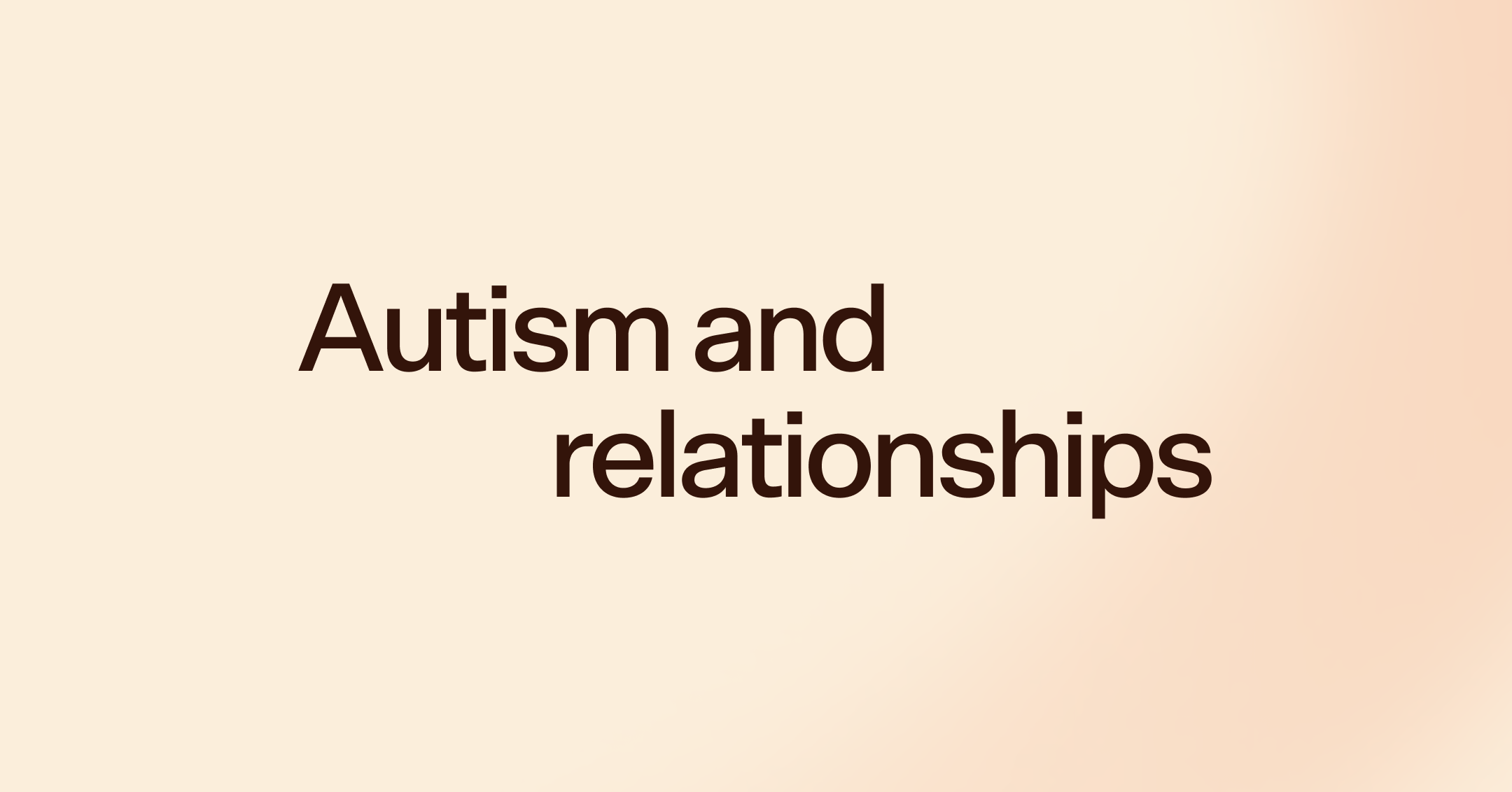Autistic people can build meaningful relationships by understanding their needs and clearly communicating.
Dating may bring challenges, but support and practical strategies — like setting boundaries — can help make connections easier and more fulfilling.
Therapy can provide guidance, helping autistic people navigate relationships with confidence.
Relationships can be exciting, meaningful, and sometimes challenging. For people with autistic spectrum disorder (ASD), or autism, social interactions and communication differences may add unique hurdles. But autistic people can also bring strengths to relationships. Understanding these dynamics can help autistic people and their partners build strong, fulfilling connections.
While autism may affect how someone experiences dating, love, and relationships, it doesn’t mean that meaningful relationships are out of reach. With self-awareness, support, and practical strategies, autistic people can navigate relationships in ways that feel authentic and rewarding.
How autism can affect romantic relationships
Romantic relationships can be both exciting and overwhelming. For autistic people, differences in communication, social cues, and sensory processing can affect dating. These differences don’t mean relationships are impossible. It just means that they may require more understanding and flexibility from both partners.
Navigating new dating experiences
Meeting new people or using dating apps can feel unpredictable. Social norms and small talk may seem confusing or exhausting. This can sometimes lead to feelings of loneliness — especially if past experiences with romantic relationships or friendships have been challenging. Being upfront about your needs and preferences can make dating more comfortable and help you build deeper connections with the right people.
Unique relationship challenges
Autistic people may interpret language literally, which can sometimes cause misunderstandings. Sensory sensitivities, routine preferences, or meltdowns may also affect how someone experiences intimacy and connection, sometimes contributing to relationship anxiety. At the same time, many autistic people are honest, deeply focused on their interests, and extremely loyal, which can strengthen relationships.
Finding strengths in differences
Every relationship has challenges, and autism can add unique dynamics. Differences in expressing affection or handling conflict may require patience and open communication. However, autism can also bring deep sincerity, unique perspectives, and strong commitment. With understanding and support, autistic people can build meaningful, fulfilling connections.
The care you need, when you need it
Learn how Rula can support your mental health journey
Eight tips for dating with autism
Dating can feel exciting but also overwhelming — especially when navigating social cues and expectations. Understanding your needs and communication style can make the process smoother and help you build meaningful connections.
Here are some practical tips to support you in dating and relationships.
Know yourself first. Take time to understand what you want in a relationship and what makes you feel comfortable. Knowing your needs, boundaries, and interests can help you find someone who appreciates you for who you are.
Be clear about communication. If social cues are tricky, it can help to be upfront about how you communicate best. Letting a partner know if you prefer direct wording or need extra time to process can reduce misunderstandings.
Practice social skills in safe spaces. If dating feels overwhelming, try practicing conversations with a trusted friend, therapist, or online community. Rehearsing common dating scenarios can help build confidence.
Set boundaries, and respect them. Knowing your limits and respecting those of others is key to healthy relationships. If you’re unsure, it’s OK to ask your partner what feels comfortable for them.
Use online dating to your advantage. Dating apps can give you time to think through messages before responding. Look for apps that allow you to filter based on interests and communication styles that work for you.
Be patient with yourself. Dating can be challenging for anyone. If a date doesn’t go well, it doesn’t mean you won’t find the right person. Give yourself grace, and focus on learning and growing from each experience.
Seek support when needed. Therapists, support groups, or mentors can help if dating feels confusing or stressful. You don’t have to figure it all out on your own.
Enjoy the process. Finding a connection takes time, but dating can also be fun. Focus on meeting new people, exploring new experiences, and staying true to yourself.
Support for autistic people in relationships
Building strong relationships takes effort, and therapy can offer valuable support by providing strategies to improve communication and emotional connection. Cognitive behavioral therapy (CBT) and other forms of talk therapy can help you understand social cues and manage anxiety in relationships.
Couples therapy can also be beneficial, providing a space to navigate misunderstandings and build mutual understanding. Support groups can be another helpful way to connect with others who share similar experiences.
If you’re looking for support, a great first step is reaching out to a therapist who understands autism and relationships. Seeking therapy can help you gain tools to navigate relationships with confidence. Talking to trusted friends or family members can also provide emotional support and encouragement. Support is available, and building a fulfilling relationship is possible with the right guidance.
If dating feels discouraging or overwhelming, remember it’s OK to go at your own pace. The right person will appreciate you for who you really are.

Brandy Chalmers, LPC
Clinical reviewer
Find care with Rula
Relationships can be exciting and meaningful, but they can also be challenging. If you’re autistic, differences in communication, social cues, or sensory experiences may make dating feel complicated. But these differences can also bring strengths, like honesty, loyalty, and deep sincerity.
With the right support and strategies, you can build connections that feel fulfilling and true to who you are. Therapy, support groups, and trusted people in your life can help. You don’t have to figure it all out alone — support is available to help you navigate relationships with confidence.
At Rula, we’re committed to delivering a comprehensive behavioral health experience that helps people feel seen and understood so they can get back to feeling their best.
Rula makes it easier to find a licensed therapist or psychiatric provider who accepts your insurance so you don’t have to choose between affordable care and excellent care. With a diverse network of more than 15,000 providers, 24/7 crisis support, and appointments available as soon as tomorrow, we’re here to help you make progress — wherever you are on your mental health journey.
Rula's editorial process
Rula's editorial team is on a mission to make science-backed mental health insights accessible and practical for every person seeking to better understand or improve mental wellness.
Members of Rula’s clinical leadership team and other expert providers contribute to all published content, offering guidance on themes and insights based on their firsthand experience in the field. Every piece of content is thoroughly reviewed by a clinician before publishing.



